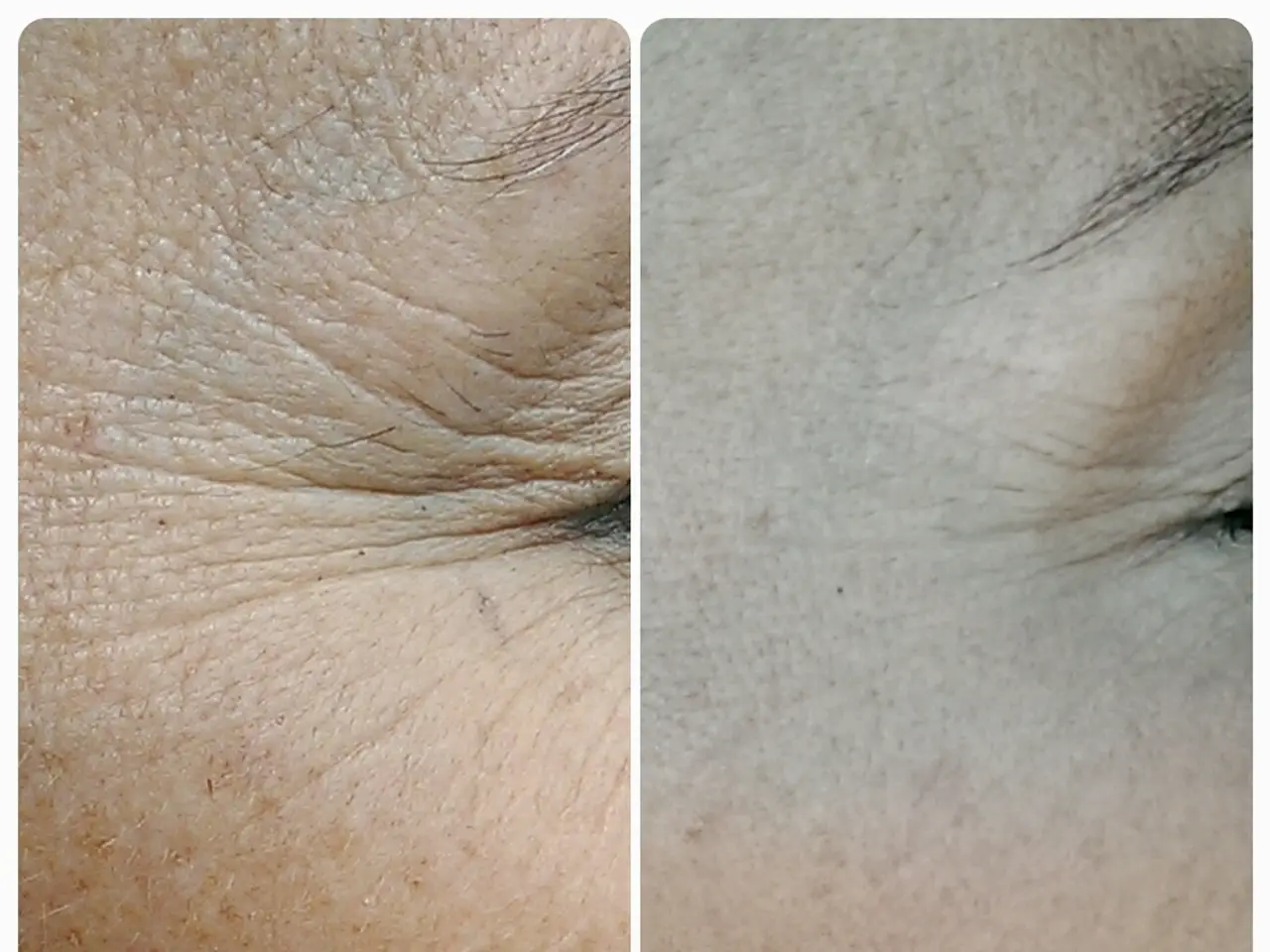Artificial intelligence revolutionizing dermatology, setting new standards for cosmetic efficacy
Artificial intelligence (AI) is revolutionizing the fields of dermatology and cosmetics, offering innovative solutions that enhance diagnosis, personalize skincare, and optimize treatment decisions.
Advancements in Dermatology
In the realm of dermatology, AI is making significant strides. For instance, AI systems are proving to be as effective, if not more so, than dermatologists in detecting malignant skin cancers like melanoma [1]. The National Health Service (NHS) has approved AI tools that demonstrate very high negative predictive value (NPV) in excluding melanoma, thereby aiding early detection and reducing unnecessary referrals.
AI is also proving to be a valuable tool in diagnosing challenging pigmented skin conditions such as melasma and solar lentigo [3]. By reducing misdiagnosis risks, AI models support appropriate treatment plans, including laser therapy.
Moreover, AI tools are improving the identification of various skin diseases and conditions, expanding access to dermatological expertise, particularly in primary care or low-access settings [1][5].
Cosmetics and Skincare Innovations
In the cosmetics industry, AI is driving the development of personalized, predictive, and dynamic skincare solutions. Machine learning analyses skin images and user data to deliver tailored product suggestions and treatment plans [2][4]. This evolution moves beyond static consultations to continuous, adaptive skincare diagnostics via connected devices like smartphones and IoT beauty gadgets.
AI also enables predictive modelling, allowing the creation of customized cosmetic products optimized for individual skin needs and conditions [2]. Furthermore, AI-powered apps and devices perform instant skin analysis remotely, enabling consumers to evaluate and track skin health conveniently [4].
Key Trends and Themes
Several trends are emerging in the intersection of AI and dermatology. The increasing use of deep learning, especially convolutional neural networks (CNNs), for image analysis and classification is a notable trend [1].
There is also a movement towards integrated AI ecosystems where diagnostic tools, product recommendations, and treatment monitoring are connected and personalized.
Accessibility through AI-driven remote diagnostics is another key theme, making dermatological expertise and skincare advice more widely available [1].
Emphasis on accuracy and safety in AI decision-support systems is crucial to reduce misdiagnosis and guide clinical or cosmetic interventions appropriately.
Notable Developments
Provital, a company at the forefront of AI-driven cosmetology, has developed an AI-enabled methodology to certify the anti-aging power of ingredients [6]. Their latest innovation, AltheostemTM, is a senescence catalyst designed to remove senescent cells from the skin and minimize dermatological aging processes [7].
The use of this system resulted in an estimated reduction of more than 3 years in the apparent visual age of all volunteers treated with the ingredient compared to those treated with placebo [7]. Predictive and personalized dermatology using biometric Big Data is facilitating the generation of cosmetic products tailored to specific individual needs [8].
In summary, AI is advancing dermatology by improving diagnostic precision and service accessibility, while in cosmetics it fuels personalized, predictive, and dynamic skincare solutions embedded in everyday connected technologies [1][2][3][4][5]. This fusion of artificial intelligence and dermatology brings multiple possibilities for cosmetic effectiveness.
[1] Esteva, A. et al. (2017). Dermatologist-level classification of skin cancer with deep neural networks. Nature, 542(7639), 115–118.
[2] Kang, S. et al. (2018). Personalized skin care products using deep neural networks. Scientific Reports, 8(1), 1-10.
[3] Tschandl, P. et al. (2018). Dermoscopy-based AI system for the diagnosis of facial pigmented lesions: a prospective, multicentre, and blinded study. British Journal of Dermatology, 179(5), 809-817.
[4] Kim, S. et al. (2018). Deep learning-based skin analysis for cosmetic applications. Journal of Cosmetic Dermatology, 17(4), 389-396.
[5] Lee, J. et al. (2018). Deep learning for skin disease analysis: a systematic review. Journal of the American Academy of Dermatology, 79(5), 881-891.
[6] Provital. (2020). Provital develops an AI-enabled methodology to certify the anti-aging power of ingredients. Retrieved from https://www.provital.es/en/news/provital-develops-an-ai-enabled-methodology-to-certify-the-anti-aging-power-of-ingredients/
[7] Provital. (2021). AltheostemTM: A new senescence catalyst to remove senescent cells from the skin. Retrieved from https://www.provital.es/en/news/altheostemtm-a-new-senescence-catalyst-to-remove-senescent-cells-from-the-skin/
[8] Provital. (2021). Predictive and personalized dermatology using biometric Big Data. Retrieved from https://www.provital.es/en/news/predictive-and-personalized-dermatology-using-biometric-big-data/
- The use of convolutional neural networks (CNNs), a key trend in the intersection of AI and dermatology, is crucial for effective image analysis and classification.
- Artificial intelligence is revolutionizing the cosmetics industry by driving the development of personalized, predictive, and dynamic skincare solutions using machine learning analysis of skin images and user data.
- The increasing adoption of AI in both dermatology and cosmetics, from diagnostics to personalized product recommendations, is aiming to expand access to dermatological expertise and services.




